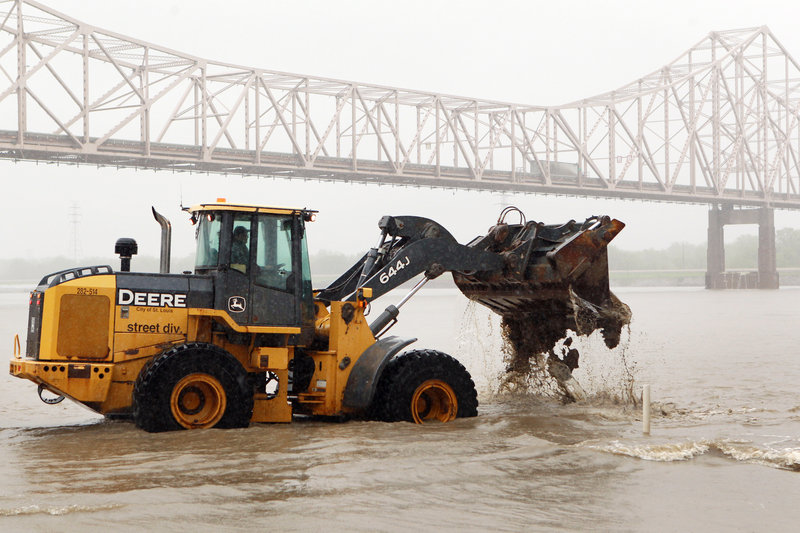ST. LOUIS – The rain-engorged Mississippi and Missouri rivers continued their troubling rises Friday, posing new headaches and costs to barges carrying everything from steel to fertilizer while also threatening a key crossing for motorists between Illinois and Missouri.
Locks are being closed at points along the Mississippi that represent important gateways between the Upper Mississippi and points south to the Gulf of Mexico, where grains and other imports make their way to global markets. Idling the locks could snarl barges headed north of St. Louis to Minnesota as well as those southbound from middle America to New Orleans.
So far, four locks have been closed between the Missouri towns of Canton and Clarksville, and a fifth is expected to shut down Saturday, ultimately bringing the affected stretch of river to some 100 miles — unwelcomed news to barge operators that haven’t caught much of a break since last year’s drought.
For barge-operating AEP River Operations, it’s a perplexing carry-over of the tumult the industry has weathered since last summer. The nation’s worst drought in decades lowered the Mississippi River to such levels that barge loads had to be curtailed so shipments rode higher in the water and didn’t scrape the riverbed. When the river reached near-historic lows in January, the river was perilously close to being shut down altogether.
Now, with the swollen Mississippi’s currents fiercer, those cargos again are being pulled back to allow for the towboats and barges to safely maneuver through treacherous river bends.
All of that is cutting into shippers’ efficiencies, slowing travel times and hiking fuel costs for operators because more trips are needed. As AEP’s senior manager of bulk sales, Marty Hettel said the company accustomed to pushing barge formations five wide and five long now are compelled to use configurations just four barges wide.
“High water is always a headache. The current gets so fast,” Hettel said for the company that, with a fleet of 3,100 barges and roughly 90 towboats, moved 74 million tons of cargo last year ranging from coal, grain, fertilizers, salt, iron ore and finished steel.
Hettel said that as of mid-Friday, the lock closures threatened to stop two AEP barges in their tracks, though that traffic jam could mushroom as the idling of the locks drag on.
Flooding doesn’t have the impact it did in years past thanks to government-funded buyouts of homes and businesses in the flood plains, a program that became urgent after the devastating Great Flood of 1993. Still, floodwaters already have swamped tens of thousands of acres of rich Midwestern farmland, closed countless roads and damaged scattered businesses and homes.
Send questions/comments to the editors.



Success. Please wait for the page to reload. If the page does not reload within 5 seconds, please refresh the page.
Enter your email and password to access comments.
Hi, to comment on stories you must . This profile is in addition to your subscription and website login.
Already have a commenting profile? .
Invalid username/password.
Please check your email to confirm and complete your registration.
Only subscribers are eligible to post comments. Please subscribe or login first for digital access. Here’s why.
Use the form below to reset your password. When you've submitted your account email, we will send an email with a reset code.